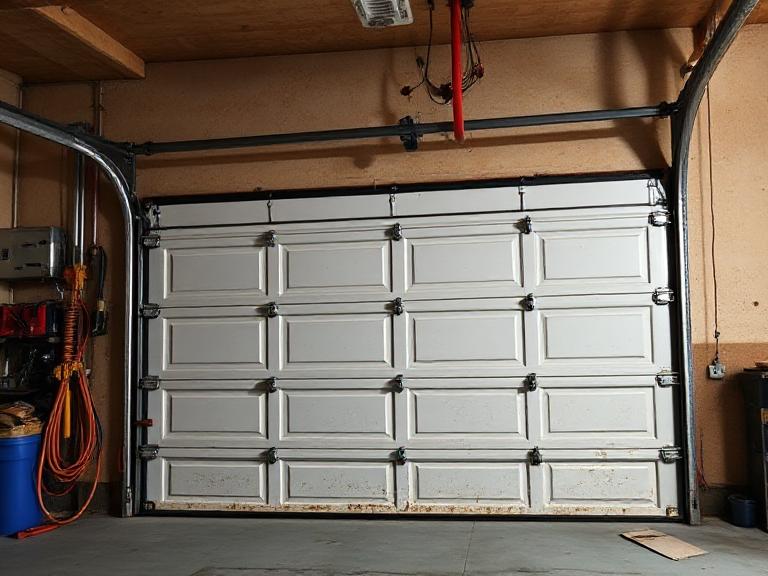If you’re asking “how long should garage door springs last?”, you’re not alone. This is one of the most common questions homeowners have about garage door maintenance. Your garage door springs are the workhorses of your entire system, bearing the weight of the door every time it opens and closes.
Table of Contents
ToggleUnderstanding their lifespan is crucial for maintenance planning and avoiding unexpected breakdowns. The short answer is that garage door springs typically last 5-15 years, but this varies widely based on several factors. This comprehensive guide will explore everything that affects spring longevity, how to recognize warning signs, and when it’s time for replacement.
We’ll cover both torsion and extension springs, maintenance tips, and why professional installation is essential for safety and performance.
Understanding Your Garage Door Spring System
Before we explore “how long should garage door springs last?”, it’s important to understand the two main types of springs.
Torsion Springs:
-
Mounted horizontally above the closed door
-
Work by twisting (torsion) to generate lifting force
-
Typically last 7-15 years
-
Generally considered safer and more durable
Extension Springs:
-
Located along the horizontal tracks on both sides
-
Stretch and contract to provide lifting power
-
Typically last 5-10 years
-
Require safety cables for protection
Both types perform the same essential function but have different lifespans and maintenance requirements.
Average Lifespan Expectations
So, exactly how long should garage door springs last? Here’s a detailed breakdown:
Standard Torsion Springs:
-
Average lifespan: 10,000 cycles
-
Typical years: 7-12 years
-
With regular use: 5-7 years (3-4 cycles daily)
Heavy-Duty Torsion Springs:
-
Average lifespan: 15,000-20,000 cycles
-
Typical years: 10-15 years
-
With regular use: 7-10 years
Extension Springs:
-
Average lifespan: 7,000-10,000 cycles
-
Typical years: 5-8 years
-
With regular use: 3-5 years
Key Factors That Affect Spring Lifespan
Several factors significantly impact how long should garage door springs last. Understanding these can help you maximize your springs’ longevity.
Usage Frequency:
-
The number of open/close cycles is the biggest factor
-
Average family: 3-5 cycles daily
-
Busy household: 10+ cycles daily
-
Seasonal variations affect usage patterns
Climate and Weather Conditions:
-
Humidity: Accelerates rust and corrosion
-
Temperature extremes: Cause metal fatigue
-
Coastal areas: Salt air increases corrosion risk
-
Four-season climates: Constant expansion/contraction
Maintenance Practices:
-
Regular lubrication extends life
-
Proper tension adjustment reduces strain
-
Clean environment prevents debris damage
-
Professional inspections identify issues early
Quality of Installation:
-
Proper sizing is crucial
-
Correct tension extends lifespan
-
Quality hardware matters
-
Professional installation lasts longer
Door Weight and Balance:
-
Heavier doors strain springs more
-
Proper balance reduces wear
-
Insulated doors are heavier
-
Wood doors require more strength
Warning Signs of Spring Failure
Knowing when springs are failing is as important as knowing how long should garage door springs last. Watch for these warning signs:

Visible Signs:
-
Gaps in torsion springs: A visible space between coils
-
Rust and corrosion: Visible deterioration on spring surface
-
Fraying cables: Worn or damaged lifting cables
-
Spring stretch: Extension springs appearing longer
Operational Signs:
-
Door struggles to open: Requires extra force to lift
-
Uneven movement: Door appears crooked or jerky
-
Loud noises: Banging, popping, or grinding sounds
-
Door won’t stay open: Falls shut unexpectedly
-
Opener strains: Motor works harder than usual
The Dangers of Worn Springs
Understanding why spring maintenance matters goes beyond knowing how long should garage door springs last. Worn springs pose serious risks.
Safety Hazards:
-
Sudden failure: Can cause injury or property damage
-
Flying debris: Broken spring pieces can become projectiles
-
Falling door: Can crash down unexpectedly
-
Cable damage: Can snap and cause additional damage
Financial Impacts:
-
Opener damage: Strains and can burn out motor
-
Track damage: Misalignment causes additional wear
-
Emergency repairs: Cost more than scheduled replacement
-
Vehicle damage: Falling door can damage cars
Maintenance Tips to Extend Spring Life
While all springs eventually need replacement, proper maintenance can maximize how long should garage door springs last.
Regular Lubrication:
-
Use garage door-specific lubricant
-
Apply every 6 months
-
Cover all spring coils evenly
-
Wipe off excess to prevent dirt buildup
Professional Inspection:
-
Schedule annual professional inspection
-
Have tension checked regularly
-
Get balance tested twice yearly
-
Address small issues before they become big problems
DIY Maintenance:
-
Keep tracks clean and debris-free
-
Test balance monthly
-
Listen for unusual sounds
-
Watch for performance changes
Environmental Protection:
-
Maintain consistent temperature when possible
-
Control humidity levels in garage
-
Protect from water exposure
-
Keep area clean and dry
When to Replace Garage Door Springs
Knowing how long should garage door springs last helps you plan for replacement before emergencies happen.
Preventative Replacement:
-
After 10,000 cycles for torsion springs
-
After 7,000 cycles for extension springs
-
When reaching age expectancy
-
Before signs of serious wear appear
Emergency Replacement Needed:
-
Visible spring breakage
-
Door won’t stay open
-
Loud bang followed by door failure
-
Visible gap in torsion spring
Professional Assessment Recommended:
-
Any visible wear or rust
-
Performance changes
-
unusual noises
-
After 7+ years of service
Cost of Spring Replacement
Understanding how long should garage door springs last helps budget for replacement costs.

Torsion Spring Replacement:
-
Single spring: $150-$300
-
Dual springs: $250-$450
-
Heavy-duty springs: $300-$600
Extension Spring Replacement:
-
Per spring: $100-$200
-
Full set: $200-$350
-
With cables: $250-$400
Factors Affecting Cost:
-
Spring type and size
-
Local labor rates
-
Emergency service fees
-
Additional repairs needed
-
Warranty coverage
Why Professional Installation is Essential
Spring replacement is not a DIY project. Here’s why professional installation matters for safety and performance.
Safety Considerations:
-
Springs under extreme tension
-
Risk of serious injury
-
Special tools required
-
Proper disposal of old springs
Quality Assurance:
-
Correct spring sizing
-
Proper tension adjustment
-
Balanced installation
-
Warranty protection
Long-Term Value:
-
Longer-lasting installation
-
Better performance
-
Reduced future repairs
-
Peace of mind
Frequently Asked Questions
Can I replace just one spring?
Always replace both springs at the same time, even if only one is broken. The other is likely near failure.
Do all garage doors have two springs?
Many modern doors have dual torsion springs for better balance and safety.
How can I count cycles?
Most openers have cycle counters, or estimate based on daily use (3 cycles daily = ~1,000 yearly).
Do warranties cover spring replacement?
Most manufacturer warranties cover defects but not normal wear and tear.
Conclusion: Planning for Spring Replacement
Understanding how long should garage door springs last is key to maintaining a safe, functional garage door system. While typical lifespan ranges from 5-15 years, regular maintenance and professional care can maximize longevity and performance.
Remember these key points:
-
Schedule annual professional inspections
-
Address warning signs immediately
-
Always replace springs in pairs
-
Never attempt DIY spring replacement
-
Budget for replacement every 7-10 years
By staying proactive about spring maintenance and replacement, you’ll ensure smooth operation, prevent emergencies, and protect your investment in your garage door system.
If your springs are approaching their expected lifespan or showing warning signs, contact a professional garage door technician for assessment and replacement. Your safety and peace of mind are worth the investment.

hello friends
my name is Sumit kumar. I am the owner of this website and I share only garage door and lift master information and only informational posts on my website. And I have written this post myself and have given you only a good guide and information.
